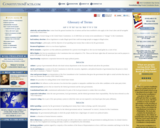
Find definitions for key terms used in the fouding documents of the United States of America
- Subject:
- History
- Social Science
- Social Studies
- Material Type:
- Reading
- Provider:
- ConstitutionFacts.com
- Date Added:
- 01/03/2023

Find definitions for key terms used in the fouding documents of the United States of America
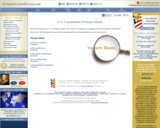
Test your knowledge of the U.S. Constitution, Supreme Court, Articles of Confederation, Founding Fathers and Declaration of Independence. Choose from five Treasure Hunts to print out and then search constitutionfacts.com to find the answers.
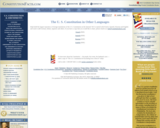
Help build the largest repository of foreign translations of the U.S. Constitution on the Internet! We’ve started with French, Spanish, Russian and English. Download pdf files of the Constitution in these languages.

U.S. government. Show what you know using this downloadable crossword puzzle.

This season, the US: Past, Present, Future team has been discussing how we learn about American history. In this program, we will take a hard look at how we teach and talk about the American Revolution and our nation's founding.
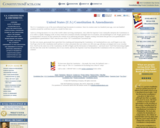
The U.S. Constitution is one of the most influential legal documents in existence. Since its creation some two hundred years ago, over one hundred countries around the world have used it as a model for their own.
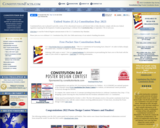
ConstitutionFacts.com is pleased to provide a series of free educational resources and Internet links to help educators comply with the new federal regulation requiring the development of student programming to celebrate U.S. Constitution Day on September 17th of each year.
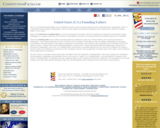
The U.S. Constitution brought together, in one remarkable document, ideas from many people and several existing documents, including the Articles of Confederation and Declaration of Independence. Those who made significant intellectual contributions to the Constitution are called the "Founding Fathers" of our country.
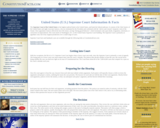
The Supreme Court of the United States is the highest judicial body in the United States, and leads the federal judiciary. It consists of the Chief Justice of the United States and eight Associate Justices, who are nominated by the President and confirmed with the "advice and consent" (majority vote) of the Senate.

In this lesson, students decide which of the rights included in the Constitution’s Bill of Rights they value the most. First, students discuss the basic rights of all Americans. Next, they read a short story (or watch a video) about a hypothetical alien creature that takes over the world. The creature is not totally hostile and will allow humans to keep five rights. Finally, students work in small groups to prioritize the five basic rights they find important and report back their findings. Access to this resource requires a free educator login.

A basic introduction for visitors to the United States Supreme Court who plan to attend and observe public oral argument

A basic introduction for visitors to the United States Supreme Court

This activity is designed to be part of a unit on the U.S. Constitution, as it focuses on U.S. voting trends. Students will analyze bar and line graphs showing the percentages of people (by race, age, sex, region, and education) who voted in elections between 1964 and 2020. Students will use these data to respond to the question “Who votes in American elections?”

The We the People: The Citizen and the Constitution Program promotes civic competence and responsibility among the nation’s upper elementary and secondary students. This webpage provides a description of the program.

This lesson explores some ideas in the Preamble to the Constitution. Students learn that the power to govern belongs to the people who have created the government to protect their rights and promote their welfare.

This lesson explores some of the ideas in the Preamble to the Constitution. Students read the Preamble and develop definitions for the six key phrases in the document.
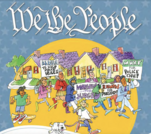
In this lesson from the We the People: The Citizen & Democracy textbook, students will learn a very simple definition of democracy from Abraham Lincoln's Gettysburg Address. The lesson introduces the essential elements of a democracy, which is a country where the people have the right to make all the rules and laws either directly or by means of elected representatives. The teacher's goal for the lesson is to help students understand what it means for a democracy to be a government that is of the people, by the people, and for the people.

In this activity, students make a poster illustrating their “best freedom.” They discuss individual freedoms they have at school and as Americans and then focus on the freedom they enjoy most. Access to this resource requires a free educator login.

In this lesson, students discuss how laws are made. In particular, they discuss what makes a good law, how representatives in Congress gather information about the issues requiring laws, and how their constituents feel about the issues and possible solutions. Through a public hearing simulation, students learn how difficult the decisions for lawmakers can be.

This two-part lesson demonstrates natural and human impact on the environment by examining changes in a hypothetical river system over time. In part one, students worked in groups to solve a hypothetical problem about a river during one of these eras. In part two, students will present their problems and solutions in chronological order, thus revealing a story of one river over time. Finally, students will discuss issues around water pollution in their own community and consider possible ways of addressing pollution problems. Ideas for service projects are also included. Access to this resource requires a free educator login.